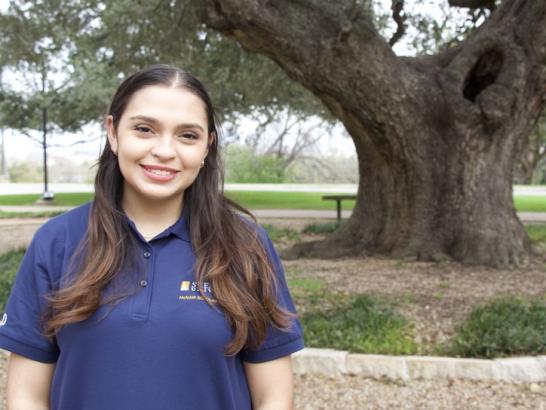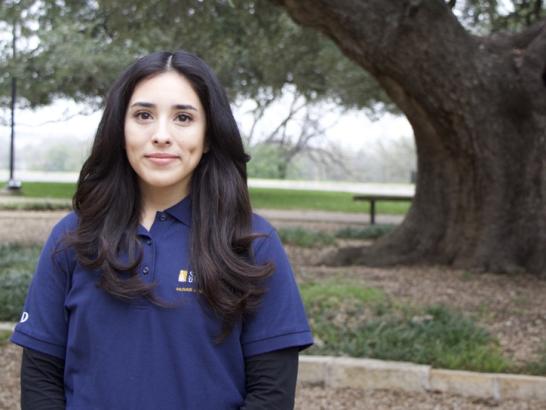New McNair Scholars

Ryan Aparicio-Aparicio
Hometown: Austin, TX
Major: Computer Science
Graduation: Spring 2026
Research Directed by Dr. Gentry Atkinson, School of Natural Sciences

Taylor Bratkovich
Hometown: Katy, TX
Major: Behavioral Neuroscience
Graduation: Fall 2025
Research Directed by Dr. Andrea Holgado, School of Natural Sciences

Derrick Cardenas
Hometown: Buda, TX
Major: Computer Science
Graduation: Spring 2026
Research Directed by Dr. Claire Edwards, School of Natural Sciences and Dr. Vishal Gajjar, SETI Institute

Nathaniel Castellanos
Hometown: Austin, TX
Major: Psychology
Graduation: Spring 2027
Research Directed by Dr. Adam McCormick, School of Behavioral and Social Sciences

Alexia Duncan
Hometown: Austin, TX
Major: Psychology
Graduation: Spring 2027
Research Directed by Dr. Nic Cabage, School of Behavioral and Social Sciences

Ethan Everman
Hometown: Dripping Springs, TX
Major: Finance
Graduation: Fall 2026
Research Directed by Dr. Camelia Rotaru, The Bill Munday School of Business

Neftali Guzman Becerril
Hometown: Santa Fe, NM
Major: Psychology
Graduation: Spring 2028
Research Directed by Dr. Adam McCormick, School of Behavioral and Social Sciences

Jimena Martinez-Olivares
Hometown: Austin, TX
Major: Biochemistry
Graduation: Spring 2027
Research Directed by Dr. Mary Kopecki-Fejtland, School of Natural Sciences

Ariana Mendez
Hometown: Austin, TX
Major: Marketing
Graduation: Spring 2027
Research directed by Dr. Katherine Lopez, The Bill Munday School of Business
Stephany Merchan
Hometown: Pflugerville, TX
Major: Psychology
Graduation: Spring 2027
Research directed by Dr. Laurie Heffron, School of Behavioral and Social Sciences

Maya Nunez
Hometown: San Antonio, TX
Major: Biochemistry
Graduation: Fall 2026
Research directed by Dr. Debamita Paul, School of Natural Sciences

Monica Rodriguez
Hometown: Houston, TX
Major: Marketing
Graduation: Spring 2027
Research directed by Dr. Wesley Pollitte, The Bill Munday School of Business

Izabella Salinas
Hometown: Pharr, TX
Major: Criminal Justice
Graduation: Fall 2026
Research directed by Dr. Michael Disch, School of Behavioral and Social Sciences

Lisette Sepeda
Hometown: Austin, TX
Major: Behavioral Neuroscience
Graduation: Spring 2026
Research Directed by Dr. Katherine Goldey, School of Behavioral and Social Sciences

Mia Villarreal
Hometown: Donna, TX
Major: Interdisciplinary Studies
Graduation: Fall 2025
Research Directed by Dr. Daniel Glenn, School of Behavioral and Social Sciences

Natalia Zavaleta
Hometown: Pflugerville, TX
Major: Biology
Graduation: Fall 2026
Research Directed by Dr. Kristopher Row, School of Natural Sciences
Returning McNair Scholars

Katia Rivera
Hometown: Austin, TX
Major: Global Studies
Graduation: Spring 2025
"Analyzing Austin’s HOME Act Through Richard Florida's Creative Class Theory"
Research Directed by Dr. David Thomason, School of Behavioral and Social Sciences
This research critically examines Austin’s HOME Act through Richard Florida's Creative Class Theory and the concept of superstar cities, focusing on the necessity of affordable housing in urban centers. By applying Florida’s framework of the Three Ts—technology, talent, and tolerance—this study evaluates the economic impacts, social implications, and policy effectiveness of the HOME Act to uncover its strengths and weaknesses in addressing housing affordability and social equity. The research also explores public response to the HOME Act and emphasizes the importance of educating the public on the link between affordable housing and essential community role. For a direct comparison, this study examines the Minneapolis 2040 Plan, which controversially eliminated single-family zoning to promote housing affordability. This comparison provides insights into how different cities address similar challenges and highlights the potential benefits and public resistance to such policies. The findings suggest that while the HOME Act offers innovative solutions, integrating community involvement mechanisms and robust public education could improve policy acceptance and effectiveness, leading to a more inclusive, affordable, and resilient urban environment in Austin.

Tatiana Ruvalcaba
Hometown: Edinburg, TX
Major: Biology & Chemistry
Graduation: Spring 2026
"Assessing Urbanization's Influence on Subdigital Lamellae in Anolis Carolinensis"
Research Directed by Dr. Kristopher Row, School of Natural Sciences
Urbanization is rapidly growing, resulting in larger and more abundant urban areas that pose significant challenges to endemic species. These challenges result in selection forces that cause species to phenotypically change their morphological traits in these urban environments. A primary difference between urban and natural environments is the abundance of non-porous artificial substrates. To directly look at the effects of these substrates, Anolis carolinensis was used due to their subdigital lamellae being used to attach to a variety of surfaces and a similar study that used a different lizard species that suggested an increase in lamellae counts in response to urbanization. To investigate, samples of A. carolinensis were gathered from urban and natural habitats to count the subdigital lamellae (toe pads) on both the largest hind limb toe and forelimb finger. To compare toe-pad counts between populations, an analysis of covariance (ANCOVA) was conducted in R, adjusting for variations in general lizard size and sex as potential confounding factors. Our analysis revealed a significant difference in forelimb toe-pad counts highlighting that A. carolinensis samples found in urban environments had on average more forelimb subdigital lamellae than those found in the natural population. These findings suggest that this species has potentially developed and improved climbing efficiency due to the relationship between lamellae counts and clinging ability.

Lor Smith
Hometown: Austin, TX
Major: Behavioral Neuroscience
Graduation: Fall 2025
"“Is It Me?” : The Interplay of Medical Gaslighting and Pain Catastrophizing"
Research Directed by Dr. Jessica Boyette-Davis, School of Behavioral and Social Sciences
This study investigates the relationship between medical gaslighting (MG) and pain catastrophizing (PC). MG is characterized by interactions with healthcare providers where patients feel invalidated, dismissed, or receive inadequate care, leading them to doubt their health perceptions (Merone et al., 2022). MG has been identified as both a psychological and sociological issue, rooted in social inequalities such as gender, race, and socioeconomic status, which exacerbate healthcare disparities (Au et al., 2022). PC involves an exaggerated fear of and preoccupation with pain, leading to a bidirectional relationship with pain perception: experiencing pain can induce catastrophic thinking, and such thinking can worsen pain outcomes (Boyette-Davis, 2023; Campbell et al., 2012; Kjogx et al., 2016; Racine et al., 2016). We hypothesized that individuals reporting higher instances of MG would also exhibit higher levels of PC. Data was collected from 10 participants (ages 19 to 52) through online surveys. Participants rated their experiences of MG and levels of PC using standardized scales. In line with our hypothesis, a statistically significant correlation was found between MG and PC. Possible contributing factors include the subjective nature of MG experiences, varying personal pain thresholds, and differing psychological resilience among individuals. These findings highlight the complexity of the relationship between MG and PC, suggesting that additional variables may influence this interaction. Further research is necessary to explore these factors and to examine the potential cultural and contextual variations in experiences of MG and PC.

Janiece Jefferson
Hometown: Houston, TX
Major: Environmental Science & Policy
Graduation: Spring 2025
"The Efficacy of Environmental Recreation Programs on the Well-Being and Development of Foster Care Children"
Research directed by Dr. Teri Varner, School of Behavioral and Social Sciences
This meta-analysis examines the efficacy of recreation programs within foster care systems. Foster care youth face various challenges that can adversely impact their overall well-being, including mental health issues, instability, or a lack of supportive relationships. The literature indicates that foster children often experience higher rates of anxiety, depression, and behavioral problems compared totheir peers (Turney & Wildeman, 2016; Burns et al., 2004). It is expected to find that outdoor recreation facilities may have lacked sufficient funds to highlight testimonials or surveys. A total of 25 environmental recreation programs were evaluated and screened for key design elements such as visual aesthetics, evaluations of post-camp experience, positive interactions, enhanced feelings of qualities that make up well-being such as self-worth, independence, confidence, and self-esteem. The meta-analysis included the examination of outdoor recreation program websites and testimonials, participant surveys, and key elements to gauge perceived benefits and efficacy of the recreation programs. Findings will be compiled into a comprehensive report that highlight the impact of outdoor recreation programs on the wellbeing of foster care youth and offer recommendations for future program development. Although research findings are not complete, it is expected that the gap in the literature will be addressed by providing a detailed examination of the specific benefits and potential limitations of outdoor recreation programs for foster care youth. It is hoped that the findings will underscore the importance of investing in nature-based interventions and outdoor recreation programs as a vital component of therapeutic and developmental support for foster care youth.
Contact Us
Hours
Monday through Friday, 8 a.m. to 5 p.m.
Location
Moody Hall
Room 126
Get in Touch
McNair Scholars Program
mcnairscholars@stedwards.edu
(512) 428-1268
